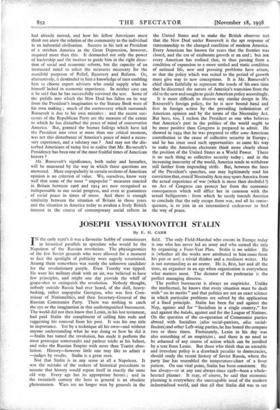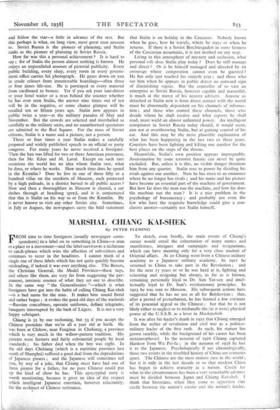JOSEPH VISSAVIONOVITCH STALIN
By E. H. CARR IN the early 1920's it was a favourite hobby of connoisseurs in historical parallels to speculate who would be the Napoleon of the Russian revolution. The physiognomies of the few Soviet generals who were allowed for a moment to Face the spotlight of publicity were eagerly scrutinised. Among them somewhere was surely the unknown candidate for the revolutionary purple. Even Trotsky was tipped. He wore his military cloak with an air, was believed to have few principles, and might one day provide the whiff of grape-shot to extinguish the revolution. Nobody thought, nobody outside Russia had ever heard, of the dull, heavy- looking, rather unpopular Georgian, who was first Com- missar of Nationalities, and then Secretary-General of the Russian Communist Party. There was nothing to catch the eye or the imagination in this undistinguished bureaucrat. The world did not then know that Lenin, in his last testament, had paid Stalin the compliment of calling him rude and suggesting his removal from his post. It was his one title to importance. Yet by a technique all his own—and without anyone understanding what he was doing or how he did it —Stalin has tamed the revolution, has made it perform the most grotesque somersaults and parlour tricks at his behest, and rules the Russian Empire with more than Tsarist abso-. lutism. History—however little one may like to admit it —judges by results. Stalin is a great man.
Not that Stalin is in any sense at all a Napoleon. It was the mistake of the seekers of historical precedents to assume that history would repeat itself in exactly the same old way. Every age has its appropriate heroes ; and in the twentieth century the hero as general is an obsolete phenomenon. Wars are no longer won by generals in the field. The only Field-Marshal who counts in Europe today is one who has never led an army and who earned the title by organising a Four-Year Plan. Stalin is no soldier. He is (whether all the works now attributed to him come from his pen or not) a trivial thinker and a mediocre writer. He is not outstanding as an orator. He is, first, last and all the time, an organiser in an age when organisation is everywhere what matters most. The dictator of the proletariat is the perfect managing director.
The perfect bureaucrat is always an empiricist. Unlike the intellectual, he knows that every situation must be dealt with" on its merits " and that politics are not an exact science in which particular problems are solved by the application of a fixed principle. Stalin has been for and against the Nep, against and .for " Socialism in a single country," for and against the kaiaks, against and for the League of Nations. On the question of the co-operation of Communist parties abroad with Socialists (alias social-patriots, alias social- fascists) and other Left-wing parties, he has boxed the compass two or three times. Fortunately, Lenin in his day was also something of an empiricist ; and there is no need to be ashamed of any course of action which can be justified by a text from Lenin. But those who think that an unstable and irresolute policy is a drawback peculiar to democracies, should study the recent history of Soviet Russia, where the party line has resembled the temperature-chart of a fever patient. On one vital point, Stalin has been consistent. He has always—or at any rate always since 1928—been a whole- hearted planner. It may, of course, be said that economic planning is everywhere the unescapable need of the modern industrialised world, and that all that Stalin did was to see and follow the star—a little in advance of the rest. But this perhaps is what, on long view, most great men amount to. Soviet. Russia is the pioneer of planning, and Stalin ranks as the pioneer of planning in Soviet Russia.
How far was this a personal achievement ? It is hard to say ; for of Stalin. the person almost nothing is known. He enjoys an unparalleled amount of pictorial publicity. Every public building, every shop, every room in every govern- ment office -carries his photograph. He gazes down on you in crude colours from innumerable hoardings—often three or four times life-size. He is portrayed in every. material from cardboard to bronze. Yet if you ask your taxi-driver or your hotel waiter or a man behind the counter whether he has ever seen Stalin, the answer nine times out of ten will be in the negative, or some chance glimpse will be recalled ten or fifteen years ago. Stalin now appears in public twice a year—at the military parades of May and November. But the crowds are selected and marshalled as carefully as the military units, and no unauthorised spectators are admitted to the Red. Square. For the mass of Soviet citizens, Stalin is a name and a picture, not a person.
"Three or four times a year Stalin makes a carefully prepared and widely published speech to an official or party congress. For many years he never received a foreigner. Then the ban was lifted. for.two or three American pressmen, then for Mr. Eden and M. Laval. Except on •such rare occasions the world has no idea whom Stalin sees, what he does, or where he works. How much time does he spend in the Kremlin ? Does he live in one of those fifty or a hundred villas on the outskirts .of Moscow, each protected by a high palisade, in a district barred to all public access ? Now and then a thoroughfare in Moscow is cleared, a car dashes through at headlong speed, and it is conjectured that this is Stalin on his way to or from the Kremlin. He is never known to visit any other Soviet city. Sometimes, in July or August, the newspapers carry the bald statement that Stalin is on holiday in the Caucasus. Nobody knows when he goes, how he travels, where he stays or when he returns. If there is a Soviet Berchtesgaden in some fastness of the Caucasian mountains, it is not marked on any map.
Living in this atmosphere of mystery and seclusion, what personal role does Stalin play today ? Does he still manage and direct ? Or is he himself managed and directed by an entourage whose composition cannot even be guessed ? He has only just reached his sixtieth year ; and those who see him when he appears in public detect no outward sign of diminishing vigour. But the controller of so vast an enterprise as Soviet Russia, however capable and masterful, is much at the mercy of his nearest advisers. Anyone as detached as Stalin now is from direct contact with the world must be abnormally dependent on his channels of informa- tion ; and those who control these channels, those who decide whom he shall receive and what reports he shall read, must wield an almost unlimited power. An intelligent conspirator in Soviet Russia today should, it would seem, aim not at overthrowing Stalin, but at gaining control of his ear. And this may be -the most plausible explanation of what has been happening in the last two or three years. Courtiers have been fighting and killing one another for the best places on the steps of the throne.
Meanwhile, Stalin's own position appears impregnable. Assassination by some terrorist fanatic can never be quite excluded. But, unless it is this, no visible danger threatens him from any quarter. Stalin rose to power by dividing his rivals against one another. Now he has risen to an eminence' where he no longer has rivals ; and his name and his picture have become an essential part of the machine of government. But how far does the man run the machine, and how far does the machine run the man ? It is a nice problem in the psychology of bureaucracy ; and probably not even the few who have the requisite knowledge could give a con- clusive answer—certainly not Stalin himself.

























































 Previous page
Previous page